





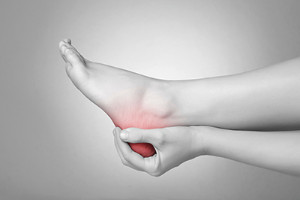 Heel pain is a condition that plagues many people, and chronic cases can be especially difficult to endure. For many common cases of chronic heel pain, plantar fasciitis is the underlying culprit; plantar fasciitis affects all types of people, though most commonly active men between the ages of 40 and 70. Plantar fasciitis pain manifests in various ways. For some people, it can be described as dull; in other cases, people feel it as a sharp pain, a burning sensation, or an ache that extends outward from the heel. There are various factors that can contribute to plantar fasciitis. To determine the cause of your heel pain and the best way to treat it, consult with your podiatrist.
Heel pain is a condition that plagues many people, and chronic cases can be especially difficult to endure. For many common cases of chronic heel pain, plantar fasciitis is the underlying culprit; plantar fasciitis affects all types of people, though most commonly active men between the ages of 40 and 70. Plantar fasciitis pain manifests in various ways. For some people, it can be described as dull; in other cases, people feel it as a sharp pain, a burning sensation, or an ache that extends outward from the heel. There are various factors that can contribute to plantar fasciitis. To determine the cause of your heel pain and the best way to treat it, consult with your podiatrist.
Many people suffer from bouts of heel pain. For more information, contact one of our podiatrists of Active Foot and Ankle Care, LLC. Our doctors can provide the care you need to keep you pain-free and on your feet.
Causes of Heel Pain
Heel pain is often associated with plantar fasciitis. The plantar fascia is a band of tissues that extends along the bottom of the foot. A rip or tear in this ligament can cause inflammation of the tissue.
Achilles tendonitis is another cause of heel pain. Inflammation of the Achilles tendon will cause pain from fractures and muscle tearing. Lack of flexibility is also another symptom.
Heel spurs are another cause of pain. When the tissues of the plantar fascia undergo a great deal of stress, it can lead to ligament separation from the heel bone, causing heel spurs.
Why Might Heel Pain Occur?
Treatments
Heel pain should be treated as soon as possible for immediate results. Keeping your feet in a stress-free environment will help. If you suffer from Achilles tendonitis or plantar fasciitis, applying ice will reduce the swelling. Stretching before an exercise like running will help the muscles. Using all these tips will help make heel pain a condition of the past.
If you have any questions please contact our offices located in Fair Lawn, Riverdale, and Englewood, NJ . We offer the newest diagnostic and treatment technologies for all your foot and ankle needs.
 Injuries at work are unfortunate events that take place from time to time as a function of working conditions, occupation, and accidents. Causes of severe, acute injuries are usually relatively easy to identify. For example, if someone who uses knives during the course of the work day gets cut, it wouldn’t be too difficult to establish causality. However, for more chronic conditions, like tarsal tunnel syndrome, this may prove to be more difficult. Tarsal tunnel syndrome results when the tibial nerve in the tarsal tunnel is compressed. The symptoms may present themselves as a burning pain in the sole or tingling and numbness at the base of the foot. Repetitive motion of the ankle and the foot may lead to this. As certain occupations require these types of motions, employees may have a greater risk of getting tarsal tunnel syndrome.
Injuries at work are unfortunate events that take place from time to time as a function of working conditions, occupation, and accidents. Causes of severe, acute injuries are usually relatively easy to identify. For example, if someone who uses knives during the course of the work day gets cut, it wouldn’t be too difficult to establish causality. However, for more chronic conditions, like tarsal tunnel syndrome, this may prove to be more difficult. Tarsal tunnel syndrome results when the tibial nerve in the tarsal tunnel is compressed. The symptoms may present themselves as a burning pain in the sole or tingling and numbness at the base of the foot. Repetitive motion of the ankle and the foot may lead to this. As certain occupations require these types of motions, employees may have a greater risk of getting tarsal tunnel syndrome.
Tarsal tunnel syndrome can be very uncomfortable to live with. If you are experiencing tarsal tunnel syndrome, contact one of our podiatrists of Active Foot and Ankle Care, LLC. Our doctors can provide the care you need to keep you pain-free and on your feet.
Tarsal Tunnel Syndrome
Tarsal tunnel syndrome, which can also be called tibial nerve dysfunction, is an uncommon condition of misfiring peripheral nerves in the foot. The tibial nerve is the peripheral nerve in the leg responsible for sensation and movement of the foot and calf muscles. In tarsal tunnel syndrome, the tibial nerve is damaged, causing problems with movement and feeling in the foot of the affected leg.
Common Cause of Tarsal Tunnel Syndrome
The Effects of Tarsal Tunnel Syndrome
A physical exam of the leg can help identify the presence of tarsal tunnel syndrome. Medical tests, such as a nerve biopsy, are also used to diagnose the condition. Patients may receive physical therapy and prescriptive medication. In extreme cases, some may require surgery.
If you have any questions please feel free to contact our offices located in Fair Lawn, Riverdale, and Englewood, NJ . We offer the newest diagnostic and treatment technologies for all your foot and ankle needs.
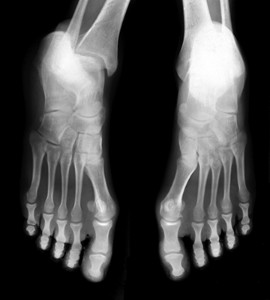 Guard T.J. Lang of the Green Bay Packers faced an upset when he reinjured his already broken foot during the NFC Championship Game against the Atlanta Falcons. Following the 44-21 match, which went to Atlanta, many wondered if Lang’s goodbyes would be his last. Next month, the former Packers guard will officially become a free agent. Lang, now 29, hopes he’ll be returning to Green Bay. “I’m just hoping (the NFC Championship Game) wasn’t the last time I get to put on that helmet,” Lang said. “It’s tough, man. Obviously, I’ll take some time, take a couple days, to rest up and recover and see what happens. I think everybody in this locker room knows that this is where I want to be.”
Guard T.J. Lang of the Green Bay Packers faced an upset when he reinjured his already broken foot during the NFC Championship Game against the Atlanta Falcons. Following the 44-21 match, which went to Atlanta, many wondered if Lang’s goodbyes would be his last. Next month, the former Packers guard will officially become a free agent. Lang, now 29, hopes he’ll be returning to Green Bay. “I’m just hoping (the NFC Championship Game) wasn’t the last time I get to put on that helmet,” Lang said. “It’s tough, man. Obviously, I’ll take some time, take a couple days, to rest up and recover and see what happens. I think everybody in this locker room knows that this is where I want to be.”
A broken foot requires immediate medical attention and treatment. If you need your feet checked, contact one of our podiatrists from Active Foot and Ankle Care, LLC. Our doctors can provide the care you need to keep you pain-free and on your feet.
Broken Foot Causes, Symptoms, and Treatment
A broken foot is caused by one of the bones in the foot typically breaking when bended, crushed, or stretched beyond its natural capabilities. Usually the location of the fracture indicates how the break occurred, whether it was through an object, fall, or any other type of injury.
Common Symptoms of Broken Feet:
Those that suspect they have a broken foot shoot seek urgent medical attention where a medical professional could diagnose the severity.
Treatment for broken bones varies depending on the cause, severity and location. Some will require the use of splints, casts or crutches while others could even involve surgery to repair the broken bones. Personal care includes the use of ice and keeping the foot stabilized and elevated.
If you have any questions please feel free to contact our offices located in Fair Lawn, Riverdale, and Englewood, NJ . We offer the newest diagnostic and treatment technologies for all your foot and ankle needs.
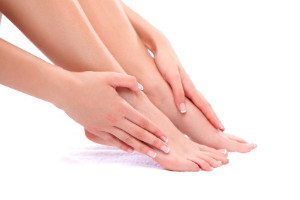 If you’re experiencing pain at the sole of your feet, you may have plantar fasciitis. The words plantar, meaning “the bottom of the foot,” and fasciitis, meaning “inflammation of fascia,” describe the inflammation of our plantar fascia, the tough band of tissue (ligament) lining the bottom of our feet. Plantar fasciitis is one of the most common foot problems seen in patients, caused by factors like continual stress or injury, as the plantar fascia becomes sensitive and can impact everyday movement. Athletes and those who exercise often are most susceptible to plantar fasciitis. Treatments such as cortisone injections, anti-inflammatory medications, therapy, icing, and arch supports can all help treat plantar fasciitis.
If you’re experiencing pain at the sole of your feet, you may have plantar fasciitis. The words plantar, meaning “the bottom of the foot,” and fasciitis, meaning “inflammation of fascia,” describe the inflammation of our plantar fascia, the tough band of tissue (ligament) lining the bottom of our feet. Plantar fasciitis is one of the most common foot problems seen in patients, caused by factors like continual stress or injury, as the plantar fascia becomes sensitive and can impact everyday movement. Athletes and those who exercise often are most susceptible to plantar fasciitis. Treatments such as cortisone injections, anti-inflammatory medications, therapy, icing, and arch supports can all help treat plantar fasciitis.
Plantar fasciitis can be very painful and inconvenient. If you are experiencing heel pain or symptoms of plantar fasciitis, contact one of our podiatrists from Active Foot and Ankle Care, LLC. Our doctors can provide the care you need to keep you pain-free and on your feet.
What Is Plantar Fasciitis?
Plantar fasciitis is the inflammation of the thick band of tissue that runs along the bottom of your foot, known as the plantar fascia, and causes mild to severe heel pain.
What Causes Plantar Fasciitis?
How Can It Be Treated?
While very treatable, plantar fasciitis is definitely not something that should be ignored. Especially in severe cases, speaking to your doctor right away is highly recommended to avoid complications and severe heel pain. Your podiatrist can work with you to provide the appropriate treatment options tailored to your condition.
If you have any questions please feel free to contact our offices located in Fair Lawn, Riverdale, and Englewood, NJ . We offer the newest diagnostic and treatment technologies for all your foot and ankle needs.
Read more about Plantar FasciitisLooking at a person’s feet can help determine how healthy their overall body is. Some important factors to look for include: sudden or chronic pain in the feet, skin discoloration which can indicate a more serious problem, and numbness or peripheral neuropathy which is typically associated with diabetes. Other symptoms of potential health problems are: swelling or edema which can be caused by insufficient veins or lymphatic ducts, cold feet which is most commonly associated with arterial disease, itchy feet which is associated with fungal infections, and changes in your foot structure, such as flatfoot. Overall, any noticeable changes should be looked at by your podiatrist, as our feet are the bedrock of our bodies.
Everyday foot care is very important to prevent infection and other foot ailments. If you need your feet checked, contact one of our podiatrists from Active Foot and Ankle Care, LLC. Our doctors can provide the care you need to keep you pain-free and on your feet.
Everyday Foot Care
Often, people take care of their bodies, face and hair more so than they do for their feet. But the feet are a very important aspect of our bodies, and one that we should pay more attention to. Without our feet, we would not be able to perform most daily tasks.
It is best to check your feet regularly to make sure there are no new bruises or cuts that you may not have noticed before. For dry feet, moisturizer can easily be a remedy and can be applied as often as necessary to the affected areas. Wearing shoes that fit well can also help you maintain good foot health, as well as making it easier to walk and do daily activities without the stress or pain of ill-fitting shoes, high heels, or even flip flops. Wearing clean socks with closed shoes is important to ensure that sweat and bacteria do not accumulate within the shoe. Clean socks help to prevent Athlete’s foot, fungi problems, bad odors, and can absorb sweat.
If you have any questions please feel free to contact our offices located in Fair Lawn, Riverdale, and Englewood, NJ . We offer the newest diagnostic and treatment technologies for all your foot and ankle needs.
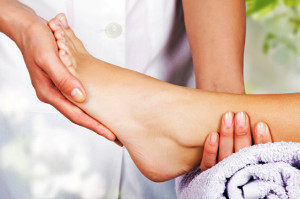 Known as a chronic autoimmune disease, lupus and its symptoms are similar to that of arthritis, affecting the tissues in the joints and leading to various problems in the feet including bunions, claw toes, and hammertoes. Lupus can also lead to tendonitis, loss of feeling or neuropathy, muscle inflammation, corns and calluses, swollen feet or oedema, and more. It is especially important to watch lupus symptoms, as infections such as gangrene can develop in a healthy person. Visit your podiatrist to assess your condition, as well as invest in proper footwear with insoles.
Known as a chronic autoimmune disease, lupus and its symptoms are similar to that of arthritis, affecting the tissues in the joints and leading to various problems in the feet including bunions, claw toes, and hammertoes. Lupus can also lead to tendonitis, loss of feeling or neuropathy, muscle inflammation, corns and calluses, swollen feet or oedema, and more. It is especially important to watch lupus symptoms, as infections such as gangrene can develop in a healthy person. Visit your podiatrist to assess your condition, as well as invest in proper footwear with insoles.
When dealing with systemic disease of the feet, it is extremely important to check the affected areas routinely so that any additional problems are caught quickly. If you have any concerns about your feet and ankles contact one of our podiatrists from Active Foot and Ankle Care, LLC. Our doctors will assist you with all of your podiatric needs.
Systemic Diseases of the Feet
Systemic diseases affect the whole body, and symptoms usually are displayed in the feet. This condition can make a patient’s ability to walk unbearable. Systemic diseases include gout, diabetes mellitus, neurological disorders, and arthritis.
Gout – is caused by an excess of uric acid in the body. Common symptoms include pain, inflammation, and redness at the metatarsal/phalangeal joint of the base big toe. Gout can be treated by NSAIDs to relieve pain and inflammation, and other drugs that lower the acid levels in the body.
Diabetes mellitus – is an increase in the level of blood sugar that the body cannot counteract with its own insulin. Failure to produce enough insulin is a factor in Diabetes.
Diabetes of the Feet
Diabetic Neuropathy – may lead to damaged nerves and affect the feet through numbness and loss of sensation.
Peripheral Vascular Disease – can restrict the blood flow to the feet, and often times lead to amputation of the feet.
If you have any questions please feel free to contact our offices located in Fair Lawn, Riverdale, and Englewood, NJ . We offer the newest diagnostic and treatment technologies for all your foot and ankle needs.
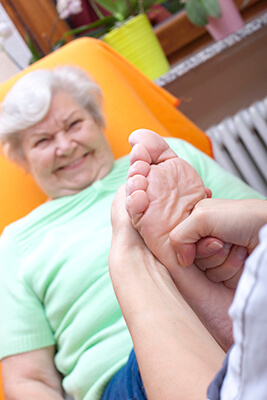 The hustle and bustle of the past holiday season may have taken a toll on your feet going into the new year. Diabetics in particular may be especially affected by the extra wear and tear the holidays bring. To allow the feet to recover from an active holiday season, consider the following tips. Maintain healthy eating habits and always monitor your blood glucose levels, clean feet daily with warm water and mild soap, moisturize dry and cracked skin, give the feet a break and put them up when sitting or resting, and wear shoes that are comfortable and broken in.
The hustle and bustle of the past holiday season may have taken a toll on your feet going into the new year. Diabetics in particular may be especially affected by the extra wear and tear the holidays bring. To allow the feet to recover from an active holiday season, consider the following tips. Maintain healthy eating habits and always monitor your blood glucose levels, clean feet daily with warm water and mild soap, moisturize dry and cracked skin, give the feet a break and put them up when sitting or resting, and wear shoes that are comfortable and broken in.
Diabetic foot care is important in preventing foot ailments such as ulcers. If you are suffering from diabetes or have any other concerns about your feet, contact one of our podiatrists from Active Foot and Ankle Care, LLC. Our doctors can provide the care you need to keep you pain-free and on your feet.
Diabetic Foot Care
Diabetes affects millions of people every year. Diabetes can damage blood vessels in many parts of the body, including the feet. Because of this, taking care of your feet is essential if you have diabetes, and having a podiatrist help monitor your foot health is highly recommended.
The Importance of Caring for Your Feet
Patients with diabetes should have their doctor monitor their blood levels because blood sugar levels play such a huge role in diabetic care. Monitoring these levels on a regular basis is highly advised.
It is always best to inform your healthcare professional of any concerns you may have regarding your feet, especially for diabetic patients. Early treatment and routine foot examinations are keys to maintaining proper health, especially because severe complications can arise if proper treatment is not applied.
If you have any questions please feel free to contact our offices located in New Jersey. We offer the newest diagnostic and treatment technologies for all your foot and ankle needs.
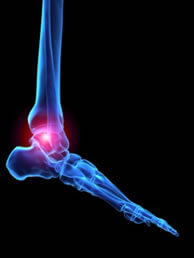 Arthritis is a condition that many people are familiar with but that not many fully understand. Successful treatment of the condition depends on the correct diagnosis, and arthritis can take on three different types: osteoarthritis, rheumatoid arthritis, and psoriatic arthritis. Each type of arthritis has its own various symptoms and treatments. If you are suffering from arthritis in your feet, consult with your podiatrist to determine the right diagnosis and the best treatment.
Arthritis is a condition that many people are familiar with but that not many fully understand. Successful treatment of the condition depends on the correct diagnosis, and arthritis can take on three different types: osteoarthritis, rheumatoid arthritis, and psoriatic arthritis. Each type of arthritis has its own various symptoms and treatments. If you are suffering from arthritis in your feet, consult with your podiatrist to determine the right diagnosis and the best treatment.
Arthritis can be a difficult condition to live with. If you are seeking treatment, contact one of our podiatrists from Active Foot and Ankle Care, LLC. Our doctors can provide the care you need to keep you pain-free and on your feet.
Arthritic Foot Care
Arthritis is a joint disorder that involves inflammation of different joints in your body, such as in your feet. Arthritis is often caused by a degenerative joint disease and causes mild to severe pain in all affected areas. On top of this, swelling and stiffness in the affected joints can also be a common symptom of arthritis.
In many cases, wearing ill-fitting shoes can worsen the effects and pain of arthritis. Wearing shoes that have a lower heel and extra room can help your feet feel more comfortable. In cases of rheumatoid arthritis, the arch in your foot may become problematic. Buying shoes with proper arch support that contour to your feet can help immensely.
Alleviating Arthritic Pain
It is best to see your doctor for the treatment that is right for your needs and symptoms. Conditions vary, and a podiatrist can help you determine the right method of care for your feet.
If you have any questions please feel free to contact our offices located in New Jersey. We offer the newest diagnostic and treatment technologies for all your foot and ankle needs.
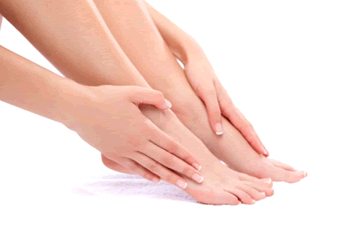 Plantar fasciitis is a foot condition that is often the source of many cases of heel pain. Just as the condition has many different causes, it also has many different treatments. One treatment that may be effective is yoga, which allows for the stretching of the feet. Suggested poses include the downward facing dog and crescent lunge, stretches that can be felt through the calves and heels; and the toes pose, which stretches the feet immediately. To determine the best treatment for your case of plantar fasciitis, first consult with a podiatrist.
Plantar fasciitis is a foot condition that is often the source of many cases of heel pain. Just as the condition has many different causes, it also has many different treatments. One treatment that may be effective is yoga, which allows for the stretching of the feet. Suggested poses include the downward facing dog and crescent lunge, stretches that can be felt through the calves and heels; and the toes pose, which stretches the feet immediately. To determine the best treatment for your case of plantar fasciitis, first consult with a podiatrist.
Plantar fasciitis can be very painful and inconvenient. If you are experiencing heel pain or symptoms of plantar fasciitis, contact one of our podiatrists from Active Foot and Ankle Care, LLC. Our doctors can provide the care you need to keep you pain-free and on your feet.
What is Plantar Fasciitis?
Plantar fasciitis is the inflammation of the thick band of tissue that runs along the bottom of your foot, known as the plantar fascia, and causes mild to severe heel pain.
What Causes Plantar Fasciitis?
· Excessive running
· Non-supportive shoes
· Overpronation
· Repeated stretching and tearing of the plantar fascia
How Can It Be Treated?
· Conservative measures – anti-inflammatories, ice packs, stretching exercises, physical therapy, orthotic devices
· Shockwave therapy – sound waves are sent to the affected area to facilitate healing and are usually used for chronic cases of plantar fasciitis
· Surgery – usually only used as a last resort when all else fails. The plantar fascia can be surgically detached from the heel
While very treatable, plantar fasciitis is definitely not something that should be ignored. Especially in severe cases, speaking to your doctor right away is highly recommended to avoid complications and severe heel pain. Your podiatrist can work with you to provide the appropriate treatment options tailored to your condition.
If you have any questions please feel free to contact our offices located in New Jersey. We offer the newest diagnostic and treatment technologies for all your foot and ankle needs.
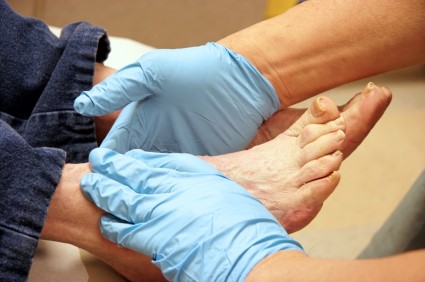 “If you want to know the state of your health, try looking down.” Poor circulation in a person’s feet can be caused by a variety of things, and it is vitally important not to ignore any hint that this may be happening to you. Symptoms to look out for include cold feet, numbness, pain, or swelling. Diabetes can lead to poor circulation in the extremities and if left untreated, can wreak havoc on your feet. But there are many other reasons for lack of blood flow, including neurological issues, Peripheral Artery Disease (PAD), and smoking, among others. Causes of these symptoms can become serious so it is imperative get to a podiatrist immediately to find out what is going on.
“If you want to know the state of your health, try looking down.” Poor circulation in a person’s feet can be caused by a variety of things, and it is vitally important not to ignore any hint that this may be happening to you. Symptoms to look out for include cold feet, numbness, pain, or swelling. Diabetes can lead to poor circulation in the extremities and if left untreated, can wreak havoc on your feet. But there are many other reasons for lack of blood flow, including neurological issues, Peripheral Artery Disease (PAD), and smoking, among others. Causes of these symptoms can become serious so it is imperative get to a podiatrist immediately to find out what is going on.
Poor circulation is a serious condition and needs immediate medical attention. If you have any concerns with poor circulation in your feet contact one of our podiatrists from Active Foot and Ankle Care, LLC. Our doctors can provide the care you need to keep you pain-free and on your feet.
Poor Circulation in the Feet
Poor blood circulation in the feet and legs is can be caused by peripheral artery disease (PAD), which is the result of a buildup of plaque in the arteries.
Plaque buildup or atherosclerosis results from excess calcium and cholesterol in the bloodstream. This can restrict the amount of blood which can flow through the arteries. Poor blood circulation in the feet and legs are sometimes caused by inflammation in the blood vessels, known as vasculitis.
Causes
Lack of oxygen and oxygen from poor blood circulation restricts muscle growth and development.
It can also cause:
Those who have diabetes or smoke are at greatest risk for poor circulation, as are those who are over 50. If you have poor circulation in the feet and legs it may be caused by PAD, and is important to make changes to your lifestyle in order to reduce risk of getting a heart attack or stroke. Exercise and maintaining a healthy lifestyle will dramatically improve conditions.
As always see a doctor as they will help try and fit a regime that suits you. A doctor will also prescribe you medication which will help for PAD.
If you have any questions please feel free to contact our offices located in New Jersey. We offer the newest diagnostic and treatment technologies for all your foot and ankle needs.
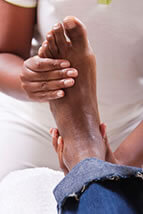 Ingrown toenails are a common foot problem and occur when the toenail begins growing into the skin on its sides. This, consequently, can lead to infections, swelling and irritation. You can prevent ingrown toenails by cutting your toenails straight across from end to end. Avoid improperly-fitting shoes, as they can squeeze your toes, potentially impacting how your toenails grow. Contact sports such as soccer that require an object to constantly impact the feet can also lead to an increased chance of ingrown toenails. If you think you may have an ingrown toenail, seek the advice of your podiatrist. While at home, soak your toenail in warm water with salt and apply antibiotic ointment afterwards. Avoid any tight bandages or socks.
Ingrown toenails are a common foot problem and occur when the toenail begins growing into the skin on its sides. This, consequently, can lead to infections, swelling and irritation. You can prevent ingrown toenails by cutting your toenails straight across from end to end. Avoid improperly-fitting shoes, as they can squeeze your toes, potentially impacting how your toenails grow. Contact sports such as soccer that require an object to constantly impact the feet can also lead to an increased chance of ingrown toenails. If you think you may have an ingrown toenail, seek the advice of your podiatrist. While at home, soak your toenail in warm water with salt and apply antibiotic ointment afterwards. Avoid any tight bandages or socks.
Ingrown toenails can become painful if they are not treated properly. For more information about ingrown toenails, contact one of our podiatrists from Active Foot and Ankle Care, LLC. Our doctors can provide the care you need to keep you pain-free and on your feet.
Ingrown Toenails
Ingrown toenails occur when a toenail grows sideways into the bed of the nail, causing pain, swelling, and possibly infection.
Causes
Prevention
Because ingrown toenails are not something found outside of shoe-wearing cultures, going barefoot as often as possible will decrease the likeliness of developing ingrown toenails. Wearing proper fitting shoes and using proper cutting techniques will also help decrease your risk of developing ingrown toenails.
Treatment
Ingrown toenails are a very treatable foot condition. In minor cases, soaking the affected area in salt or antibacterial soaps will not only help with the ingrown nail itself, but also help prevent any infections from occurring. In more severe cases, surgery is an option. In either case, speaking to your podiatrist about this condition will help you get a better understanding of specific treatment options that are right for you.
If you have any questions please feel free to contact our offices located in New Jersey. We offer the newest diagnostic and treatment technologies for all your foot and ankle needs.
 Last month was National Diabetes Awareness month, as diabetes is “a worldwide health problem characterized by the body’s inability to break down sugar due to an inefficiency of the hormone insulin.” If left untreated, diabetes can lead to more severe problems such as diabetic ulcers, poor blood circulation, dry and cracking skin, and infections. Proper footwear, routine checks, and seeing your podiatrist are vital toward injury prevention. About “12 percent of those with diabetes will develop plantar ulcers and they’re responsible for approximately 85 percent of amputations of the lower extremities in diabetic patients.” Your podiatrist can help with managing foot hygiene as well as monitoring your blood sugar levels.
Last month was National Diabetes Awareness month, as diabetes is “a worldwide health problem characterized by the body’s inability to break down sugar due to an inefficiency of the hormone insulin.” If left untreated, diabetes can lead to more severe problems such as diabetic ulcers, poor blood circulation, dry and cracking skin, and infections. Proper footwear, routine checks, and seeing your podiatrist are vital toward injury prevention. About “12 percent of those with diabetes will develop plantar ulcers and they’re responsible for approximately 85 percent of amputations of the lower extremities in diabetic patients.” Your podiatrist can help with managing foot hygiene as well as monitoring your blood sugar levels.
Diabetic foot care is important in preventing foot ailments such as ulcers. If you are suffering from diabetes or have any other concerns about your feet, contact one of our podiatrists from Active Foot and Ankle Care, LLC. Our doctors can provide the care you need to keep you pain-free and on your feet.
Diabetic Foot Care
Diabetes affects millions of people every year. Diabetes can damage blood vessels in many parts of the body, including the feet. Because of this, taking care of your feet is essential if you have diabetes, and having a podiatrist help monitor your foot health is highly recommended.
The Importance of Caring for Your Feet
Patients with diabetes should have their doctor monitor their blood levels because blood sugar levels play such a huge role in diabetic care. Monitoring these levels on a regular basis is highly advised.
It is always best to inform your healthcare professional of any concerns you may have regarding your feet, especially for diabetic patients. Early treatment and routine foot examinations are keys to maintaining proper health, especially because severe complications can arise if proper treatment is not applied.
If you have any questions please feel free to contact our offices located in New Jersey. We offer the newest diagnostic and treatment technologies for all your foot and ankle needs.
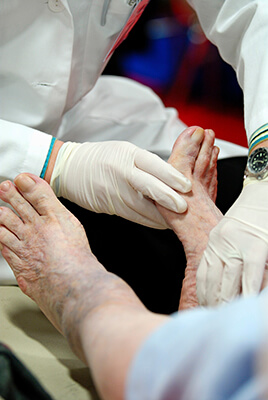 As we get older, we become more prone to foot problems. We lose the cushioning in our feet, and our nails and skin become brittle and dry without proper treatment. Poor circulation also becomes a common problem among seniors, leading to an increased risk of foot sores. Proper circulation can be improved with daily exercise. The elderly are also advised to avoid wearing tight socks and sitting for long periods of time, to wear comfortable footwear, and to maintain good foot hygiene. Improperly-fitting shoes can lead to long-term problems such as corns, bunions and calluses.
As we get older, we become more prone to foot problems. We lose the cushioning in our feet, and our nails and skin become brittle and dry without proper treatment. Poor circulation also becomes a common problem among seniors, leading to an increased risk of foot sores. Proper circulation can be improved with daily exercise. The elderly are also advised to avoid wearing tight socks and sitting for long periods of time, to wear comfortable footwear, and to maintain good foot hygiene. Improperly-fitting shoes can lead to long-term problems such as corns, bunions and calluses.
Proper foot care is something many older adults forget to consider. If you have any concerns about your feet and ankles, contact one of our podiatrists from Active Foot and Ankle Care, LLC. Our doctors can provide the care you need to keep you pain-free and on your feet.
The Elderly and their Feet
As we age we start to notice many changes in our body, but the elder population may not notice them right away. Medical conditions may prevent the elderly to take notice of their foot health right away. Poor vision is a lead contributor to not taking action for the elderly.
Common Conditions
Neuropathy – can reduce feeling in the feet, and can hide many life threating medical conditions.
Reduced flexibility – prevents the ability of proper toenail trimming, and foot cleaning. If left untreated, it may lead to further medical issues.
Foot sores – amongst the older population can be serious before they are discovered. Some of the problematic conditions they may face are:
Gouging toenails affecting nearby toe
Shoes that don’t fit properly
Pressure sores
Loss of circulation in legs & feet
Edema & swelling of feet and ankles
Susceptible Infections
Diabetes and poor circulation can cause general loss of sensitivity over the years, turning a simple cut into a serious issue.
If you have any questions please feel free to contact our offices located in New Jersey. We offer the newest diagnostic and treatment technologies for all your foot and ankle needs.
 With 26 bones in each foot, our feet play a large part in our everyday activities. Therefore, it’s important to take care of our feet to prevent conditions such as arthritis or other ailments. The Huffington Post recommends some particular tips in ensuring proper foot care. These include wearing properly-fitting shoes that do not squeeze our feet and that accommodate your specific foot structure. If you have balance problems, going barefoot may help with stimulation of your foot structure. Walk on different surfaces and take note of your own gait.
With 26 bones in each foot, our feet play a large part in our everyday activities. Therefore, it’s important to take care of our feet to prevent conditions such as arthritis or other ailments. The Huffington Post recommends some particular tips in ensuring proper foot care. These include wearing properly-fitting shoes that do not squeeze our feet and that accommodate your specific foot structure. If you have balance problems, going barefoot may help with stimulation of your foot structure. Walk on different surfaces and take note of your own gait.
Every day foot care is very important to prevent infection and other foot ailments. If you need your feet checked, contact one of our podiatrists from Active Foot and Ankle Care, LLC. Our doctors can provide the care you need to keep you pain-free and on your feet.
Every Day Foot Care
Often, people take care of their bodies, face and hair more so than they do for their feet. But the feet are a very important aspect of our bodies, and one that we should pay more attention to. After all, without our feet, we would not be able to perform most daily tasks. It is best to check your feet regularly to make sure there are no new bruises or cuts that you may not have noticed before, for example.
For dry feet, moisturizer can easily be a remedy and can be applied as often as necessary to the affected areas. Wearing shoes that fit well can also help you maintain good foot health, as well as making it easier to walk and do daily activities without the stress or pain of ill-fitting shoes, high heels, or even flip flops.
Also, wearing clean socks with closed shoes is important to ensure that sweat and bacteria do not accumulate within the shoe. Clean socks help to prevent athlete’s foot, fungi problems, bad odors, and can absorb sweat.
If you have any questions please feel free to contact our offices located in New Jersey. We offer the newest diagnostic and treatment technologies for all your foot and ankle needs.






